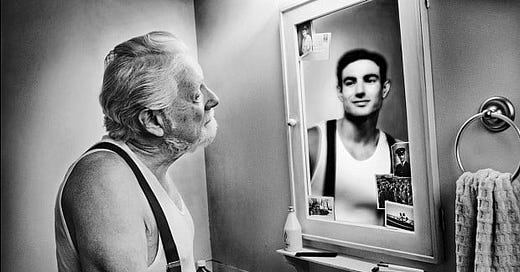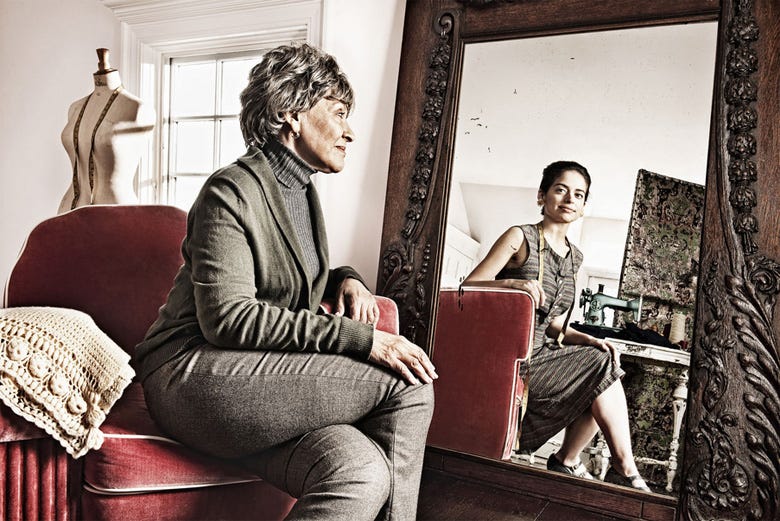Port Medway, Nova Scotia, July 14, 2024
Looking in the mirror
We each have a mental image of ourselves. Our self-image may be a result of wishful thinking, or hubris, or some mad narcissistic fantasy (narcissism: a drive to feel unique). Some part may internalize what others say about us. Our self-image may be upbeat and aspirational, or gloomy and self-deprecating, or completely bonkers. As our circumstances change, we may (or may not) adjust or revise how we think of ourselves. The process of adjustment can be difficult, painful, perhaps impossible.
About thirty years ago, when I was a pushy corporate lawyer on Toronto’s Bay Street, my daughter G described me one day as an alpha male. I’m not sure she meant it as a compliment but at the time I was pleased. An alpha male, Google tells us, is “bold, self-confident, and demanding.” That was me, or so I thought then. I incorporated this rebarbative description into the self-image I had in those days.
Now the worm has turned. Recently I went to a Blue Jays baseball game with G (we’ve been going to Jays games together for many years). When the game was over, fifty thousand fans clogged the exits. G led the way out of the stadium with her old father following close behind. She frequently looked back to be sure that I was still there and in one piece. I was touched by her concern and grateful for it.
I’m not nearly as bold and self-confident as I once was. Now, to see me, you must, more often than not, as G did when we left the baseball game, look behind, not ahead.
A lot of self-image adjustments are necessary when you become elderly (I turn eighty in a few days). For most people old age brings with it frailty and medical problems. Until a few months ago I never thought about this: I felt pretty good, and my doctor, after an annual physical, told me I was a “healthy older male” (he forgot to say anything about my being bold and self-confident). Then suddenly I had two unexpected health crises, back-to-back (I wrote about one of them in an earlier newsletter).
These health crises shook my conception of myself. Suddenly I felt vulnerable. Now I’m nervous about things I never thought about before. More than anything else, like all members of my cohort, I’m afraid of falling. I want to know: Where’s the nearest hospital? I wonder: Is it safe for me to use the Toronto subway, what with all those stairs at the stations? (Shamefully, there are either no elevators at these stations or, if there are, they are often out-of-service. It seems the City could care less about its elderly inhabitants.)
Adjusting your self-image has its dangers. You don’t want to go from one extreme to another, from flâneur to frightened recluse. You don’t want to go from thinking of yourself as bold and self-confident to seeing yourself as doddery and in danger. The response to changed circumstances should be proportionate and sensible. Otherwise, you reduce life’s opportunities unnecessarily. Maybe it’s fine to use the Toronto subway, despite the system’s decrepitude (a metaphor for your own frailty). But be careful. Hold on to the handrail as you go down the stairs. And by all means take that trip to Italy. Carefully.
Not long before my mother died, at age 93, she said to me, “I look in the mirror and I see an old person. But I don’t feel like an old person.” She hadn’t changed her self-image all that much in her old age, and I loved her for it. She was still the beautiful and kind woman she had always been.







May I say that I was surprised that you'll soon be eighty. Immediately, I thought to myself, eighty looks good. What am I so afraid of? This year I became sixty-five. Suddenly, I feel the pressure of the time I've wasted dwelling in regret. Oh dear. What have I done with my time? What time do I have left and what can I cram in? The career that never was? What should I hurry to be, so that I become something before I become nothing forever? Thank you, I think, for reminding me of my finiteness.
Weeping is an unadulterated expression straight from the body. Years ago when I lived in Ontario and was going through a difficult separation, I attended weekly yoga classes. The stillness and silence of the simple white studio space, in conjunction with body movements, and the particular teacher's non-judgemental acceptance of my quiet weeping throughout her class, made those Thursday noon hours a longed-for weekly retreat from my daily struggles. It was a safe place to just be, move, feel, and cry. We don't always know why we feel the way we do, nor do we need a reason. Understanding and empathy are the best friends of those feelings that our culture tends to avoid, hide, and repress. I have often found comfort in the writings of Jungian Analyst James Hollis, as well as Rumi's famous poem, The Guest House.